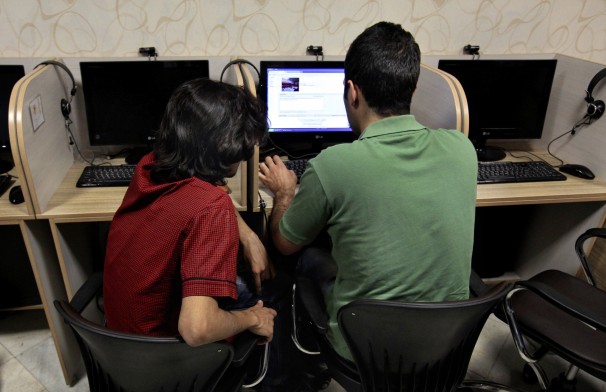 TEHRAN � Only a handful of countries rival Iran for having the slowest Internet speeds in the world. Simple online tasks can take hours, infuriating some who see the sluggishness as emblematic of a broader paralysis.
TEHRAN � Only a handful of countries rival Iran for having the slowest Internet speeds in the world. Simple online tasks can take hours, infuriating some who see the sluggishness as emblematic of a broader paralysis.�The way they block bandwidth here is like a virtual dam,� Reza Mohammady, a Web designer, said.
But now Iran is promising to change.
�The work has already begun,���President Hassan Rouhani�declared the other day, �and by the grace of God, it will continue.��
By the end of March, the government says, average bandwidth will double � though even that step would leave Iran ranked about 135th in the world, up from its current 170th, according to comparisons published by�Netindex.com.
It is in many ways a surprising turnabout for Iran, which has spent years tightly controlling all Internet services, whether private or state-owned. The country has kept speeds in check while filtering access to sites it deems politically dangerous.
But now Rouhani himself seems to be acknowledging that those restrictions have been counterproductive, in part as barriers to Internet commerce. He promised Tuesday that Iran�s youth could count on �effective measures�� in the coming year.
�We are still very far behind,�� Nasrollah Jahangard, the deputy minister of communication and information technology, told domestic reporters recently. The current average speed of two megabytes per second, about one-tenth of the global average, ranks Iran just behind Belize and Equatorial Guinea. Hong Kong, the world leader, boasts an average of 72 mbps; the United States ranks 31st, at about 21 mbps.
With a population of 76 million, Iran has by far the highest total number of Internet users in the Middle East. About half of all Iranian households have Internet access, a penetration rate that is about the regional midpoint.
It can take hours, though, to download a video clip or access an online bank account, and Internet access is often disrupted by unexplained interruptions in service.
While many problems persist, officials do say that Internet speeds have accelerated by 30 percent since last summer, after thepresidential election�that installed Rouhani and has been accompanied by moves toward greater openness.
And by March 2015, officials pledge, bandwidth will have expanded tenfold.
�Humanity needs the Internet for many purposes,�� Mahmoud Vaezi, the information technology minister, said in televised comments this year. �We should take steps to improve the Internet experience of people, including making shopping and paying bills online and arranging the delivery of packages easier.��
Internet merchants here say the new government measures to improve access are already having a positive impact.
�The speed of the Internet is getting much better, and this is helping e-commerce a lot,� Ehsan Golabgir, chief executive of Albasco.com, said. In the past year, his company�s sales have doubled in terms of both volume and revenue, he said.
Golabgir is among a group of more than 20 of Iran�s largest online shops that have formed a coalition to lobby the government on issues such as making online shopping tax-free, cracking down on fraudulent sites and raising bandwidth.
Business leaders say that Iran now has more than 20,000 active online stores, most of which are now seeking official licensing.
Faranak Oskoui, the deputy director of Iran�s Center for E-commerce Development, said that among applicants for electronic retail licenses, nearly 70 percent are younger than 30. He said the sector had the potential to employ large numbers of young people in a country where government figures say youth unemployment is running at 26 percent, though some estimates put it much higher.
�E-commerce has the potential to create a lot of jobs, and since setting up these activities does not require big investment, many young people are attracted to this field,� Oskoui said.
As Internet businesses grow, Iranian authorities are now grappling with the challenge of businesses and are starting to address how to protect consumer interests.
In the first move to reduce online fraud, Iran�s central bank will stop accepting transactions from unlicensed Web sites at the beginning of the new Iranian year in March. Currently, only about $300,000 in online sales is being officially tallied in Iran each day, but those figures will skyrocket once the new regulations are implemented and all transactions are tracked.
Even without clear regulations in place yet, people here are becoming increasingly comfortable with transacting electronically.
Electronics, especially mobile phones, are the most popular items being sold online in Iran, but everything from Persian rugs and new cars can now be purchased on the Web. Two of Iran�s state-owned supermarkets even offer the option of shopping from one�s computer.
No one here expects Web sales to replace brick-and-mortar shops any time soon. But because Iran is home to some of the world�s cheapest gasoline, Internet businesses may benefit from the low cost of delivery services, in a culture where motorcycle couriers are available at all hours.
Decades of access to some of the world�s cheapest fuel have made the cost of transportation in Iran much less than in other countries, resulting in a culture of easy and efficient delivery services. Web stores are using this to their advantage, especially in the massive and congested capital, Tehran, where motorcycle deliverymen are available at all hours.
�Life necessities will force our people to shop online rather than wasting their time on the crowded streets. Iranians will buy things on the Internet in the coming years that they can�t imagine today,� said Farzad Ensafi, marketing manager at esam.ir, a leading Iranian e-commerce site.
By The Washington Post
The Iran Project is not responsible for the content of quoted articles.











